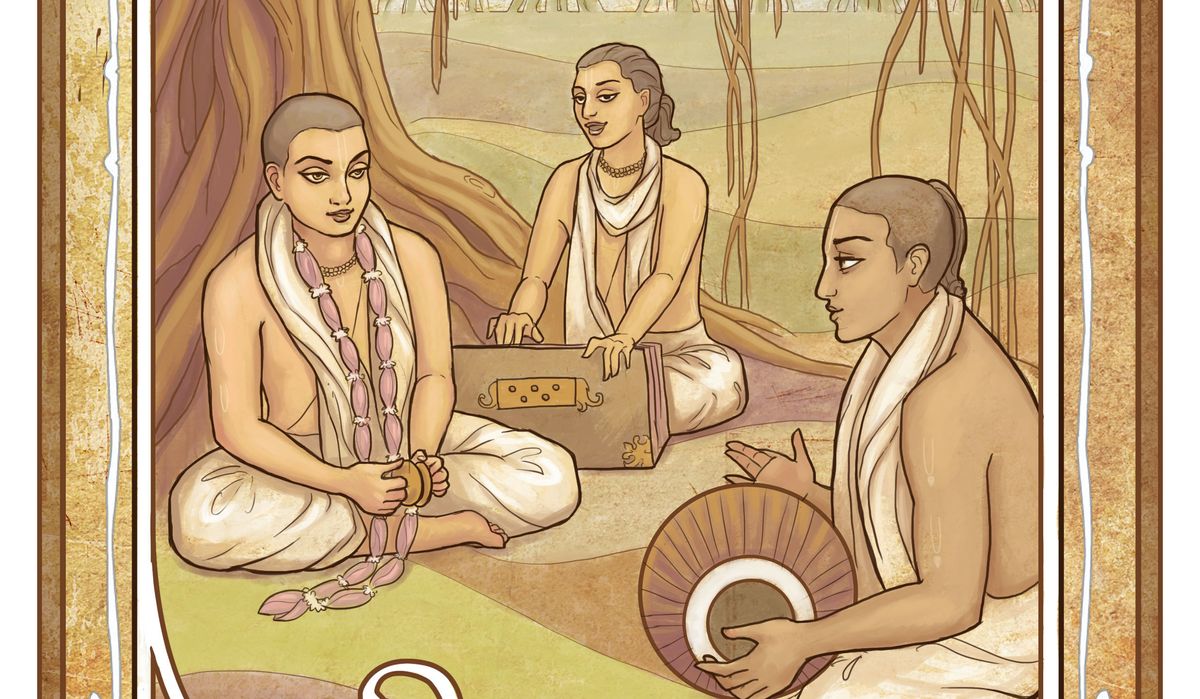R-s 4a 😌 Only the devotee of Kṛṣṇa is peaceful

Cc Madhya 19.144–149
This week, we are going through the next eight verses of Rūpa-śikṣā where Mahāprabhu explains the increasing rarity of one who has taken birth the human species, then of one who follows the scriptures, then of one who engages in fruitive activity, and then of one who has spiritual knowledge, and then of one who is liberated and then finally, among millions of such liberated persons, how rare it is to find a devotee of Kṛṣṇa.

Then we come to the verse of the week that we'll be memorizing wherein Mahāprabhu explains how the devotee of Kṛṣṇa is free from all [selfish] desire and is therefore completely peaceful, whereas those desiring enjoyment, liberation or mystic powers are always disturbed.
Find all these verses at the bottom of the page.
Here is the first video I made for this section:
So far we’ve only had to memorize three verses but still I’ve been going through and explaining in a bit more detail the language for all the verses. Someone asked me why I'm doing this so I thought I might as well explain here in case anyone else has been wondering as well.
What I'm hoping devotees will be able to get out of this program is the ability to understand the gist of these verses just by looking at the Bengali. I can’t remember if I mentioned the following before, so please excuse me if I’m repeating myself. When I was a teenager in the gurukula in New Braj (Badger), a devotee from England named Śyāma Prabhu gave us a few Bengali lessons. I think it was in the first class when he explained the language in Śrī Guru-caraṇa-padma to us. With that little push to understand the meaning of the words, along with some basic grammar, I slowly started being able to figure out the meaning of other songs as well. My enthusiasm began to grow. It was a paradigm shift for how I would approach Bengali verses. Suddenly all the songs of Śrīla Bhaktivinoda Ṭhākura were much more accessible.
Before, I was dependent on translations and wouldn’t pay much attention to the original Bengali. Even after singing a song over a hundred times, I'd still not be able to sing it without the help of the songbook. But when I made a little effort to understand the Bengali words directly and use translations just to figure out what certain Bengali words meant, then suddenly, without trying, songs automatically began to stick in my head.
So in this video I focus mainly on the language. Tomorrow I’m going to work on making a video about an explanation I heard on this last verse and the impact it had on me during a difficult time. I'll also go over the next verse, text 150.
It's midnight here now and I have a lot to do tomorrow. It takes me a surprisingly long time to make these videos. I didn't realize what I was signing up for! I'm hoping with practice, I'll be able to make them in less time. I may not be able to have the video before our next Zoom session. We'll see what happens.
For those wanting joining the Sunday (or Saturday) Zoom programs, you'll now find a link on the top menu of vineofdevotion.com
Here are this week's verses:
Text 144
tāra madhye ‘sthāvara’, ‘jaṅgama’ — dui bheda
Among them (the 8.4 million species), immobile beings (sthāvara) and mobile beings (jaṅgama) are the two divisions.
jaṅgame tiryak-jala-sthalacara-vibheda
Mobile beings are further divided into those that move in air (tiryak), in water (jalacara) and on land (sthalacara).
Text 145
tāra madhye manuṣya-jāti ati alpatara
Among them (mobile beings), human beings are very few in number.
tāra madhye mleccha, pulinda, bauddha, śabara
Among them (humans), there are like mlecchas (uncivilized persons), pulindas (primitive clans), Buddhists, and śabaras (mountain tribesmen) [who do not abide by the Vedas].
Text 146
veda-niṣṭha-madhye ardhek veda ‘mukhe’ mane
Among those who acknowledge the Vedas, half pay only lip service to the Vedas.
veda-niṣiddha pāpa kare, dharma nāhi gaṇe
They engage in sinful acts opposed to the Vedas, not caring for dharma.
Text 147
dharmācāri-madhye bahuta ‘karma-niṣṭha’
Among those who follow dharma, most are fixed in karma (fruitive acts).
koṭi-karma-niṣṭha-madhye eka ‘jñānī’ śreṣṭha
Among crores of those fixed in karma, there is one jñānī (one in knowledge), who is topmost.
Text 148
koṭi-jñāni-madhye haya eka-jana ‘mukta’
Among crores of jñānīs, there may be one person who is liberated.
koṭi-mukta-madhye ‘durlabh’ eka kṛṣṇa-bhakta
Among crores of liberated persons, one rare individual may be a devotee of Kṛṣṇa.
Text 149
kṛṣṇa-bhakta — niṣkāma, ataeva ‘śānta’
A devotee of Kṛṣṇa is free from all [material] desire and is therefore peaceful.
bhukti-mukti-siddhi-kāmī, sakali ‘aśānta’
Those desiring material enjoyment, liberation and mystic perfections are all restless.
See you in the next one!
Aspiring to please Śrīla Gurudeva and the Vaiṣṇavas,
–Madhukar das



Comments ()